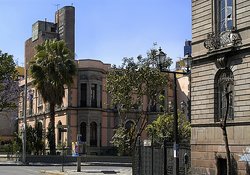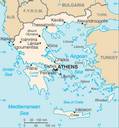
By: Angelo Di Pasquale
Some of us would love to go
Europe while others would love to leave it.
This paper will talk about the hardships and movement of a Greek immigrant as well as speak about the insights and ideas of this man. The immigrants name is Gustavus but throughout the paper he will be called Gus as he is commonly called. “Just call me Gus, everyone else does, it’s easier to say than Gustavus (said with an accent). Gus is a restaurant owner and his restaurant is located in downtown Scottsdale; because of his business and some of his views we will not use his last name. He says “much of my business comes from ASU kids so I will not like them to know what I am saying about the US…” The paper is written without the questions being asked directly but they will be implied.
In downtown Scottsdale there are many places where a person can eat but few have the attraction of a good home cooked meal from a person who cares about his own business. The food is traditional New York food as Gus would say. As Gus says often many restaurants have become “commercial” and few have care and love put into it as he does. Gus is the chef and the owner and the server at times. The best tip he can get is bringing a friend in the next time you visit his shop. “I take pride in everything I do, everything.” As in many books that are written about immigration, most of the immigrants come with a dream to work for themselves and help their family as much as possible. In JoAnn Kultyk’s book New Pioneers in the Heartland: Hmong Life in Wisconsin; Gus shares similar views on family and tradition. When speaking about helping financially and support Gus says “when deciding on whether or not to help a relative just do it and don’t think and it will be done faster and with more pride.” An interesting thought when compared to the Hmong because the Hmong also kept family ideals in their mind.
When we discussed the book briefly Gus said “the Hmong are ok but instead of helping by giving money back home just pay for them to come here, am I right, if there’s a will there’s a way, American values.” At hearing that I laughed because it made sense. The idea is not as easy to implement but if there is a will there is a way. Also we spoke about his family and how they help each other. Gus said that he helped his family come to the US and then helped them get employed. Originally he lived in New York and helped family get established there. After he was there he got arthritis and decided to move to a warmer climate. “Arizona was not my first choice but I am here anyway.”
When asked the question “Why did you leave?” he looked at me and didn’t respond readily. He took his time and said “I tell people when they ask me that I left for more opportunity, but for your paper the truth is I left because I was afraid to be like my parents. I was young I thought America was where people who want a better life should go, my uncle was there and he loved it. After I was here for a few years all I could think about was home.” He still considers Volos, Greece his home after 23 years as do many immigrants. On my other interview with Juan, a Mexican immigrant, he too considers Chihuahua, Mexico home even though he has lived in Arizona longer than he lived in Mexico.
Gus did not want to work in an olive field his whole life. His parents made good money but he wanted more. He wanted to be able to open something of his won and work when he wanted to work. “America has all the opportunities to those that are American.” After being here for 23 years he can tell you that immigrants do not have the same treatment as do people who are born here with “American names.” When we spoke about that he said “Americans look at me like I am Greek, because I am. But it does not matter what I do here [in the US], I am Greek.”
I made the mistake in comparing his immigration with some of the books I read in this class as well as other classes. Gus told me that Americans do that all the time, we assimilate other cultures as best as possible and he questions, why? In a book called Orientalism by Dr. Said, the same question is discussed. The book talks about mainly the Middle East but the same ideas are portrayed. The US culture groups the entire Middle East as one country or culture as discussed in the book. Even though I was not grouping he was upset that I wanted to compare his move with another group.
We spoke about his family and how they were able to come to the US. I
asked him if he was able to help them and he was able to let some of them live with him until they were able to move out on their own. Gus also lent money and help establish some credit. After speaking about his mother and father he was able to tell me that they did not come here because of poverty; actually they moved here for family. Since Gus’ mother had almost all her family living in the US and Gus’ father wanted a change they moved to the US. Gus’ mother Nina’s family moved here for opportunity and education. They were told how easy the ability to go to advance school (college, master’s programs, etc.) was in the US.
Gus moved here in 1981 when he was seventeen. His first job was working for his uncle in landscaping where he was able to learn what hard work was. His uncle used to tell him a saying in Greek which translated means “work with your head not your back.” After working with him for a few months he obtained a job in a bakery. Gus would wake up at 2 am to be at the shop by 3:30 to start baking bread and danishes for the day. He worked hard and in all types of conditions. Gus told me that he worked in the back where the temperature felt as if it were 200 degrees. With many immigrants such as in the book Voyages: From Tongan Villages to American Suburbs where the Tongans where working in jobs that had long hours for minimal pay. For that reason Gus decided to leave and start his won bakery.
After he decided he wanted to open his own bakery; he saved all the money he could. He even worked with his uncle on weekends to save money. After three years he was able with the help of two of his cousins to open and invest in his own bakery properly called Nick’s Bakery. “I had to rent everything: ovens, pans, windows, the bakery, everything.” He eventually bought everything and then was able to pay off his cousins to own the bakery by himself. After, living in New York for 10 years he opened two more bakeries and one sandwich shop. He worked long hours and worked everyday.
He married a girl named Nina, which is also his mother’s name. As he said, marrying a woman with the same name as your mother is good and bad. The good out weighs the bad so it is ok. They were married for 12 years before she passed away in a car accident. She was killed by a drunk driver on 40th street and Bell Road. They lived in Arizona for 4 years before her life was ended tragically. We briefly talked about his feelings and what he and his children went through. Gus seemed as if he did not want to open up to me because I was writing this paper. He talks as if she was the only one that understood him and the only one that he would ever marry.
Nina, Gus’ wife, took care of both of their children. One is eight and the other is 10. Their children do not speak Greek because Gus wants them to be Americanized. This term has been used in many books and articles. Actually in an article in the New York Times discussing immigration the word Americanized was used. The writer Peter Tierney spoke about some of the hardships immigrants go through because of the differences in culture. I spoke with Gus about how he feels being Greek in an American society. “It makes me feel as if I sometimes do not belong. Movies make Greeks hard weird people. My Big Fat Greek Wedding is an example of what Greeks go through. We are portrayed as rough people who yell and eat weird food while the American family is dainty and eats properly. If Americans eat properly and Europeans eat so bad than why the overweight problem…” He asked me how I felt when in movies Italians are portrayed as mobsters. At that point I understood what he was trying to say.
We spoke about his business in Arizona and why he got into the sandwich shop business and not the bakery. He told me that after working in a bakery for so long he lost the taste for anything sweet, the smell of sugar makes him ill. He could not and does not ever want to do that again. When he moved out here he went into business and owned a market on the West side of town. After owning that for a year he opened a sandwich shop in Old Town Scottsdale, where he lives. He wanted to be able to leave his wife at home and then work the shop by himself. It was important to him that his wife stays home to watch and take care of the family. At this point he works the shop while his children are at school and then he works sometimes on the weekend. He hired more people to work when he is not there.
Gus’ children do not know their mother as well as Gus does. He tells them stories and wants them to know how important she was. He also is very close to her side of the family and has her brother living at his house right now. He is living their until his career as an artist takes off. He acts as if his brother in law is his own brother, sometimes he works at the shop.
We spoke about different things but the main point that he was trying to make was that immigrants in this country do not get the help that they deserve. “We come from nothing and make something and for that we are looked down upon. All my money I have worked hard for, whatever money I borrowed I have repaid, whatever money I made I reinvested…” those words ideal for this class. Throughout the semester we spoke about different groups and all of them having the same problem, not being wanted in the US. Hmong, Tongans, Mexicans, etc. all come here for a better living and all are treated as if they are not wanted. “…think about what New York would be without the added culture, a dirty boring city.” The country can be looked at with the same thought. What would Arizona be without the added Mexican culture? After speaking with him I was able to speak with my own parents that are immigrants and understand what they were talking about when they told me stories.
